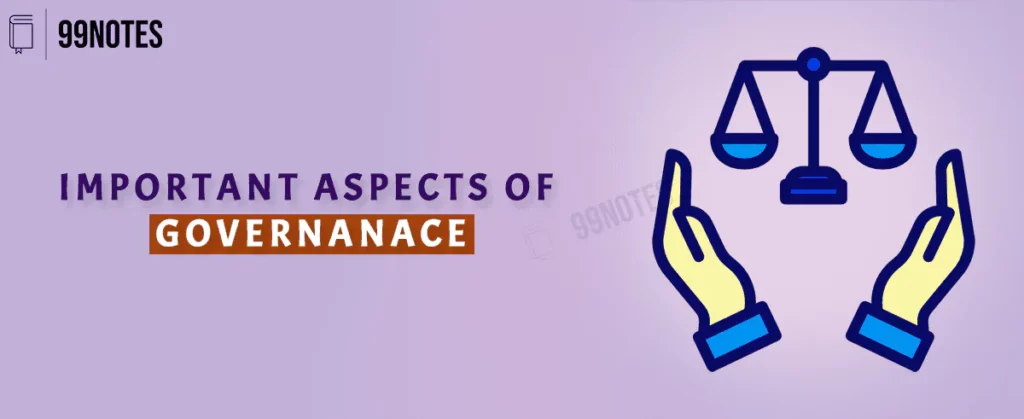
Important Aspects of Governance Free UPSC Notes Download
More About Important Aspects of Governance
What is Governance?
In 1993, the World Bank defined governance as the process through which a country’s political, economic, and social resources are administered for its growth.
Governance is the method and institutions through which decisions are made and power is exercised within a country.
Governance may be employed in a variety of circumstances, including corporate governance, international governance, national government, and local governance.
Consequently, governance focuses on the formal and informal players and institutions involved in decision-making and decision-implementation.
Participants in Governance
Government is an important actor in governance. Other possible participants include political actors and institutions, interest groups, civil society, the media, non-governmental organisations, and transnational organisations. Other participants in governance differ according on the level of government.
Generally speaking, the stakeholders of governance at the national level may be divided into three basic categories:
- State
- Market
- Civil Society
- The State comprises the several government institutions (Legislature, Judiciary, and Executive) and their respective instrumentalities, independent accountability systems, etc. It also includes several players (elected officials, political executives, bureaucracy/civil workers at various levels, etc.).
- The Market comprises the private sector, both organised and unorganised, which consists of huge corporate houses and small size industries/establishments.
- The Civil Society is the most diversified and often consists of all organisations not included in (a) or (b) (b). Non-Governmental Organizations (NGOs), Voluntary Organizations (VOs), media organizations/associations, trade unions, religious groups, pressure groups, etc. are included.
There are several important aspects of governance that are relevant to the UPSC CSE (Civil Services Exam) in India. These include:
- Rule of law: The rule of law is a principle of governance that ensures that all individuals and institutions are subject to and bound by the law. It promotes social stability, protects the rights and freedoms of citizens, and promotes accountability and transparency in government.
- Separation of powers: The separation of powers is a principle that divides the powers of government among different branches (e.g. legislative, executive, and judicial) in order to prevent the concentration of too much power in any one branch. It helps to ensure that no one branch becomes too powerful and can act as a check on the power of the other branches.
- Transparency: Transparency in government refers to the idea that government processes and decision-making should be open and accessible to the public. It helps to promote accountability and trust in government, as well as to prevent corruption and abuse of power.
- Accountability: Accountability requires government officials and institutions to be answerable to the people for their actions and decisions. It helps to ensure that government actions are responsive to the needs and concerns of the people and promotes trust in government.
- Responsiveness: Responsiveness is the ability of the government to respond to the needs and concerns of the citizens. It helps to ensure that government actions are responsive to changing circumstances and meet the evolving needs of its citizens.
- Participation: Participation is the opportunity for citizens to have a say in the decisions that affect them and to be actively involved in the political process. It helps to ensure that the views and needs of all members of society are taken into account in the decision-making process and promotes a sense of ownership and responsibility among citizens.
- Inclusiveness: Inclusiveness is the idea that all members of society should have an equal opportunity to participate in and benefit from the political process, regardless of their background or identity. It helps to ensure that the voices and perspectives of all members of society are heard and that policies and decisions reflect the needs and concerns of the entire community.
- Efficient and effective service delivery: Service delivery refers to the provision of necessary services (e.g. healthcare, education, infrastructure) by the government to the citizens. Efficient and effective service delivery helps to ensure that citizens have access to the services they need in a timely and effective manner.
- Social justice: Social justice is the pursuit of fairness and equality in society, including the fair distribution of resources and opportunities. It helps to ensure that all members of society have an equal opportunity to succeed and thrive.
- Environmental sustainability: Environmental sustainability is the idea that development should be undertaken in a way that protects and preserves the natural environment for future generations. It helps to ensure that the needs of current and future generations are taken into account in decision-making and that the natural environment is protected for the benefit of all.
Some additional resources that may be helpful for further study include:
- “The Principles of Good Governance” by the United Nations Development Programme (UNDP) (https://www.undp.org/content/undp/en/home/librarypage/democratic-governance/good-governance/the-principles-of-good-governance.html)
- “Principles of Good Governance” by the World Bank (https://www.worldbank.org/en/topic/governance/brief/principles-of-good-governance)
What is the 3 aspect of governance?
The three pillars of corporate governance are: transparency, accountability, and security. All three are critical in successfully running a company and forming solid professional relationships among its stakeholders which include board directors, managers, employees, and most importantly, shareholders.
What are the 16 principles of good corporate governance?
What are the moral values of governance?
What are the 10 governance areas?

